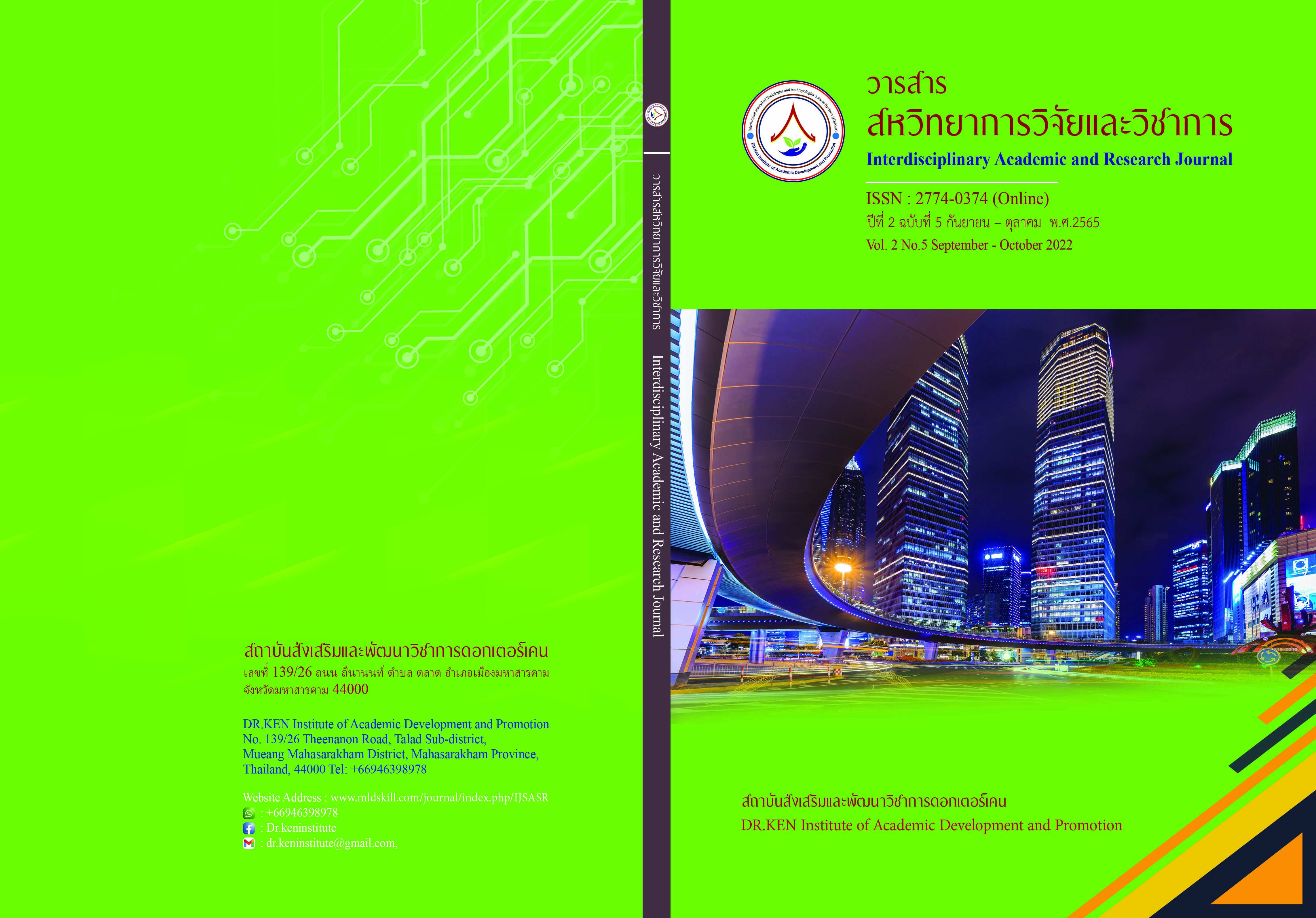Knowledge, Attitude and Use of Cannabis in Mueang Sa Kaeo District, Sa Kaeo Province
DOI:
https://doi.org/10.14456/iarj.2022.108Keywords:
Cannabis; , Knowledge; , Attitude; , UsageAbstract
Due to the rapidly changing situation regarding medicinal uses, especially cannabis is a plant that is gaining attention from around the world and in Thailand, which has various research results that have been used for medical purposes, especially in resisting the treatment of many diseases, which are not difficult to find in information in the media in almost every country. Thus, the objectives of this study were to study the knowledge, attitude, and use of cannabis by people in Mueang Sa Kaeo District, Sa Kaeo Province; to compare the knowledge, attitude, and use of cannabis by gender, age, education level, and occupation; and to study the problems and suggestions about the use of cannabis. In this study, the qualitative research methodology was used. The population used in the research was general people in Mueang Sa Kaeo District, Sa Kaeo Province using numbers from 53,900 voters in 2021, a sample of 382 people by using Krejcie & Morgan’s tables. Field data was collected using questionnaires and quizzes. In the field, data was collected from the sample to check its integrity. And perform data analysis using statistical methods. by using a computer program and offering statistics. The field data collection was conducted through questionnaires and field tests. The results showed that the majority of people had a medium level of knowledge about cannabis and the overall attitudes towards cannabis was at a high level. The analysis showed that the overall use of cannabis was at the lowest level. A comparison of knowledge revealed that males and females had similar levels of knowledge about cannabis. People under the age of 35 and with a higher education level than a diploma had a higher level of knowledge than other groups. As for the occupation, it was found that government officials and state enterprise employees had higher levels of knowledge than other groups. Problems with the use of cannabis were found to be the result of the ambiguity of the law. Suggestions of problems with the use of cannabis include the public relations signs and posters should be posted at the broadcasting towers in every village, the provisions of the law should be clear for the proper practice of the people and the Royal Thai Police should make a clear statement about the illegal use of cannabis that will lead to arrest by the police.
References
กรมการแพทย์. (2562). การอบรมการใช้กัญชาทางการแพทย์. นนทบุรี: กระทรวงสาธารณสุข.
พิทยา สุนทรประเวศ. (2564). การพัฒนากัญชาทางการแพทย์ในวิสาหกิจชุมชน. วารสารวิชาการไทยวิจัยและการจัดการ. 2 (1),73-86.
มนัสชนิญ ชัยสุวรรณ. (2565). การศึกษาการใช้ประโยชน์จากกัญชาของนักศึกษาหลักสูตรวิชาชีพการแพทย์แผนไทย (แผน ก.) ในจังหวัดนนทบุรี และปทุมธานี (วิทยานิพนธ์ปริญญามหาบัณฑิต), มหาสารคาม:มหาวิทยาลัยราชภัฏมหาสารคาม.
รังสรรค์ สิงหเลิศ. (2558).ระเบียบวิธีวิจัยและการใช้สถิติสำหรับการวิจัยทางสังคมศาสตร์. กรุงเทพฯ : ทริปเพิ้ล กรุ๊ป.
ราชกิจจานุเบกษา. (2562). กำหนดตำรับยาเสพติดให้โทษในประเภท 5 ที่มีกัญชาปรุงผสมอยู่ที่ให้เสพเพื่อรักษาโรคหรือการศึกษาวิจัยได้ (ฉบับที่ 3) พ.ศ.2562. กรุงเทพฯ: เล่ม 136 ตอนพิเศษ 210.
ราชกิจจานุเบกษา. (2562). พระราชบัญญัติยาเสพติดให้โทษ (ฉบับที่ 7) พ.ศ. 2562. กรุงเทพฯ: เล่ม 136 ตอนที่ 19.
วิชัย โชควิวัฒน. (2562). กัญชา กัญชา เป็นยาวิเศษ จริงหรือ. วารสารการแพทย์แผนไทยและการแพทย์ ทางเลือก. 17 (2) 324-340.
วีรยา ภาอุปชิต และ นุศราพร เกษสมบูรณ์. (2560). การใช้กัญชาทางการแพทย์. วารสารเภสัชศาสตร์อีสาน. 13 (1), 226-240.
สำนักงานคณะกรรมการกฤษฎีกา กองกฎหมายไทย (2557). พระราชบัญญัติยาเสพติดให้โทษ พ.ศ.2522 (ฉบับอ้างอิง). กรุงเทพฯ: สำนักงานคณะกรรมการกฤษฏีกา.
สุรพงษ์ โสธนะเสถียร. (2533). การสื่อสารกับสังคม. กรุงเทพฯ: โรงพิมพ์จุฬาลงกรณ์มหาวิทยาลัย.
Bloom, B. S. (1971). Mastery learning. In J. H. Block (Ed.), Mastery learning, theory and practice (pp. 47-63). New York: Holt
Cesar Leos-Toro, Geoffrey T. Fong, Samantha B. Meyer, and David Hammond. (2020). Cannabis health knowledge and risk perceptions among Canadian youth and young adults. Harm Reduction journal. 17 (1), 1-13.
Juan Manuel Orjuela-Rojas, Xiomara Garcia Orjuela, Sabina Ocanpo Serna. (2021). Medical cannabis: knowledge, beliefs, and attitudes of Colombian psychiatrists. J Cannabis Res. 3(1), 1-10.
Karanges, E. A., Suraev, A., Elias, N., Manocha, R., & Mc Gregor, I. S. (2018). Knowledge and attitudes of Australian general practitioners towards medicinal cannabis: a cross-sectional survey. BMJ open, 8 (7), e022101.
Krejcie, R. V. & Morgan, D. W. (1970). Determining Sample Size for Research Activities. Educational and Psychological Measurement, 30(3), 607-610.
Rogers, E. (1978). Mass Media and Interpersonal Communication. Chicago: Rand Mcnally College Publishing Company.
Rokeach, Milton. (1970). Beliefs, Attitudes, and Values. San Francisco : Jossey Basso, Inc.
Downloads
Published
How to Cite
Issue
Section
License
Copyright (c) 2022 Panisara Sawetchotthanakon, Rungson Singhalert, Danwichai Sairuksa

This work is licensed under a Creative Commons Attribution-NonCommercial-NoDerivatives 4.0 International License.
Copyright on any article in the Interdisciplinary Academic and Research Journal is retained by the author(s) under the under the Creative Commons Attribution-NonCommercial-NoDerivatives 4.0 International License. Permission to use text, content, images, etc. of publication. Any user to read, download, copy, distribute, print, search, or link to the full texts of articles, crawl them for indexing, pass them as data to software, or use them for any other lawful purpose. But do not use it for commercial use or with the intent to benefit any business.
















.png)


